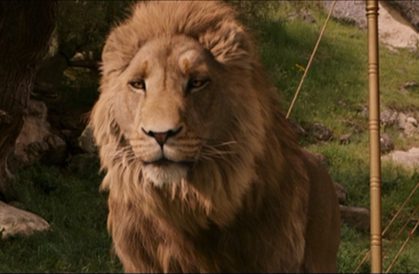When things aren’t tame, we get hurt or sick or hungry. But without hunger, pain, or anguish, we lose the ability to appreciate the real good when it comes.

Mr. Tumnus: He’s not a tame lion.
Lucy Pevensie: No… but he is good.
“He’s not a tame lion.” Anyone who has read The Chronicles of Narnia series by C.S. Lewis or seen either of the two Narnia movies would recognize that line. It’s Aslan’s description. Aslan, the great lion who inhabits Narnia, shows up periodically, generally to bring right a situation where great injustice is being perpetuated.
Lucy Pevensie, the smallest of the four Pevensie children, recognizes that while Aslan is not a tame lion, he is good.
Why is the distinction important? Because when we confuse “tame” with “good” we lose a gigantic amount of power and creativity. Power and creativity are two of the most important ways we live out the image of God, stamped upon our souls.
When we insist on taming everything, we lose the ability to live radically good lives.
I’ve seen much research on how our children need to eat dirt to build up healthy immune systems. One article is here in case you are interested. Spoiler alert: it concludes by suggesting we’re all better off if some worms periodically inhabit our bodies. So, if you are squeamish about such things, don’t read the article.
I liked it, however, because I’m growing more concerned about the need to tame, i.e., make perfectly safe, the world we inhabit. We risk robbing it of its goodness.
Let’s face it: “tame” tomatoes, those cultivated on massive farms with carefully metered chemical fertilizers, grown to a uniform size and washed in a bleach solution to remove all possible contamination by field workers, do not belong in the same world as “good” tomatoes.
Good tomatoes: grown in rich, well-composted animal manure and often uneven in texture, cracked and sunburnt, and then picked right off the vine and eaten immediately, a salt shaker in hand.
The warmth of the sunshine, penetrating deep inside, enhances the rich flavor of the tomato. The juice drips down the chin, and heaven enters in.
But it’s not tame. It’s not washed and sterilized and checked for any possible contaminants. It’s just good.
We’ve lost the spirit of adventure by our need to tame the world.
When things aren’t tame, we get hurt or sick or hungry. But without hunger, pain, or anguish, we lose the ability to appreciate the real good when it comes. And we especially fail to recognize it when it appears in the form of Jesus who was also most definitely not tame.
Jesus called his disciples to leave everything behind, to live lives of radical goodness, to go all the way to death for their enemies. Jesus modeled exactly that for them–and was resurrected to show us goodness, not tame safety.
It’s just time to quit thinking we can tame our lives and starting living genuinely good ones instead.












